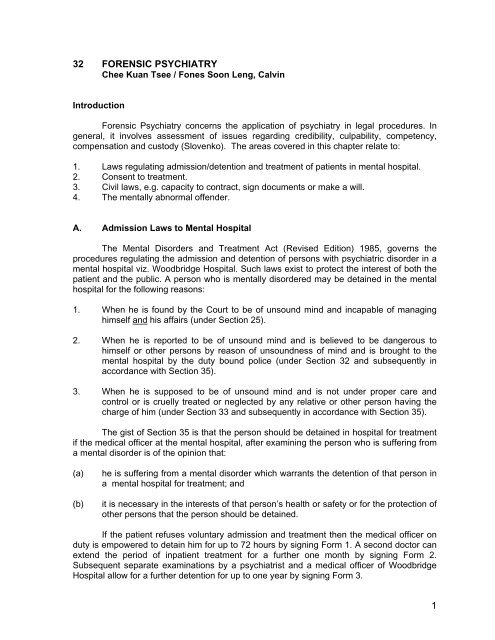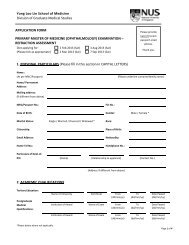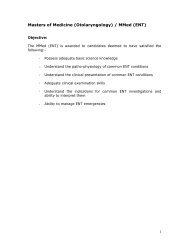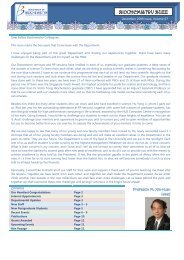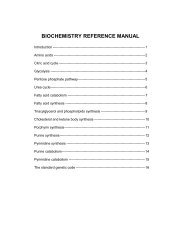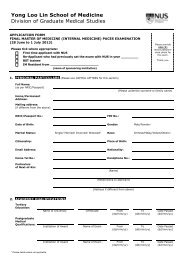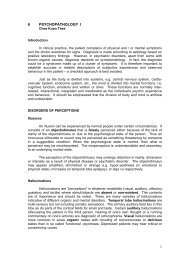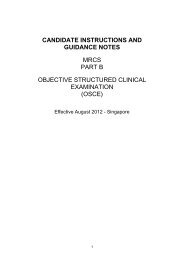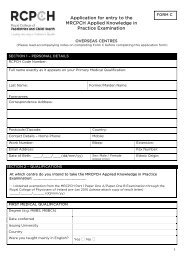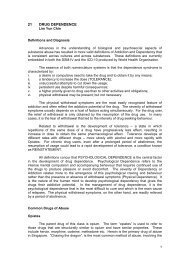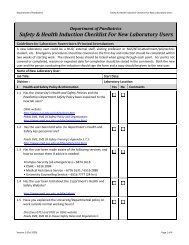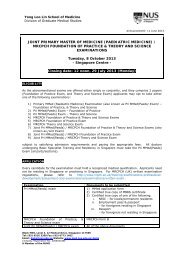FORENSIC PSYCHIATRY
FORENSIC PSYCHIATRY
FORENSIC PSYCHIATRY
You also want an ePaper? Increase the reach of your titles
YUMPU automatically turns print PDFs into web optimized ePapers that Google loves.
32 <strong>FORENSIC</strong> <strong>PSYCHIATRY</strong><br />
Chee Kuan Tsee / Fones Soon Leng, Calvin<br />
Introduction<br />
Forensic Psychiatry concerns the application of psychiatry in legal procedures. In<br />
general, it involves assessment of issues regarding credibility, culpability, competency,<br />
compensation and custody (Slovenko). The areas covered in this chapter relate to:<br />
1. Laws regulating admission/detention and treatment of patients in mental hospital.<br />
2. Consent to treatment.<br />
3. Civil laws, e.g. capacity to contract, sign documents or make a will.<br />
4. The mentally abnormal offender.<br />
A. Admission Laws to Mental Hospital<br />
The Mental Disorders and Treatment Act (Revised Edition) 1985, governs the<br />
procedures regulating the admission and detention of persons with psychiatric disorder in a<br />
mental hospital viz. Woodbridge Hospital. Such laws exist to protect the interest of both the<br />
patient and the public. A person who is mentally disordered may be detained in the mental<br />
hospital for the following reasons:<br />
1. When he is found by the Court to be of unsound mind and incapable of managing<br />
himself and his affairs (under Section 25).<br />
2. When he is reported to be of unsound mind and is believed to be dangerous to<br />
himself or other persons by reason of unsoundness of mind and is brought to the<br />
mental hospital by the duty bound police (under Section 32 and subsequently in<br />
accordance with Section 35).<br />
3. When he is supposed to be of unsound mind and is not under proper care and<br />
control or is cruelly treated or neglected by any relative or other person having the<br />
charge of him (under Section 33 and subsequently in accordance with Section 35).<br />
The gist of Section 35 is that the person should be detained in hospital for treatment<br />
if the medical officer at the mental hospital, after examining the person who is suffering from<br />
a mental disorder is of the opinion that:<br />
(a)<br />
(b)<br />
he is suffering from a mental disorder which warrants the detention of that person in<br />
a mental hospital for treatment; and<br />
it is necessary in the interests of that person’s health or safety or for the protection of<br />
other persons that the person should be detained.<br />
If the patient refuses voluntary admission and treatment then the medical officer on<br />
duty is empowered to detain him for up to 72 hours by signing Form 1. A second doctor can<br />
extend the period of inpatient treatment for a further one month by signing Form 2.<br />
Subsequent separate examinations by a psychiatrist and a medical officer of Woodbridge<br />
Hospital allow for a further detention for up to one year by signing Form 3.<br />
1
No one with any fiduciary relationship to the patient should sign any order under the<br />
Act. Discharge from the hospital can take place once the patient is considered fit by the<br />
psychiatrist.<br />
B. Consent to Treatment<br />
For medical (psychopharmacological) treatment of psychiatric patients, no formal<br />
consent is obtained and is implied if no objections are made. If the treatment is necessary<br />
but there is refusal because of impaired judgement arising from illness, the patient can be<br />
made an involuntary patient and treated.<br />
For electroconvulsive therapy (ECT), permission should be sought from all patients<br />
who are able to understand and give consent after explanation. If the patient is not<br />
competent to give consent, this can be obtained from the next of kin or an immediate family<br />
member. If none is available then a second opinion and concordance should be sought from<br />
another consultant psychiatrist.<br />
Sometimes, the psychiatrist is consulted regarding whether a mentally ill individual is<br />
able to give consent for a surgical procedure. Provisions governing consent to medical<br />
treatment in Singapore is found in sections 87-92 of the Penal Code. In essence, it requires<br />
that a person giving consent is able to understand the nature and consequence of the<br />
procedure. As far as possible the patient should give his own consent.<br />
Some mental conditions fluctuate in severity and consent may be obtained during a<br />
lucid period, as long as he is, at the time able to understand the nature of the operation, the<br />
risks involved and consequences. If the patient is unable to give consent, the next-of-kin can<br />
give consent on his /her behalf. In the event of emergencies, a procedure done in good faith<br />
for a person who is unable to give consent, is not considered an offence provided it is for the<br />
purpose of treatment.<br />
C. Civil Laws<br />
Civils laws concern the rights and obligations of individuals to one another and deal<br />
with matters like property and inheritance or contracts.<br />
Psychiatric input is sought at times concerning fitness to make a will, validity of<br />
marriage contracts or guardianship, or capacity to manage one’s own affairs.<br />
1. Testamentary Capacity<br />
This refers to an individual’s capacity to make a will. A will made by someone with<br />
mental illness may be challenged by potential beneficiaries who query its validity. Psychiatric<br />
opinion about whether a person is of “sound disposing mind” would entail assessing if the<br />
person knows:<br />
a) What a will is and what the consequences of it are.<br />
b) The nature and extent of his property.<br />
c) Who the potential beneficiaries are.<br />
2
Most importantly, the psychiatrist determines whether the existence of a mental<br />
illness has affected judgement pertaining to the above factors. The presence of a mental<br />
illness in and of itself need not necessarily affect the patient’s ability to make a will.<br />
2. Capacity to Manage own Property and Affairs<br />
Relatives of patients who are in possession of valuable estates e.g. property, money,<br />
shares etc. may be concerned about the effect of mental illness on their capability to<br />
manage their affairs. A patient may give written authorization, i.e. power of attorney, to<br />
someone else to act on his behalf.<br />
However if the person is alleged to be mentally disordered, is of unsound mind and<br />
incapable of managing himself and his affairs then the Court may appoint a committee or<br />
committees of the person and his estate and the management thereof.<br />
3. The Marriage Contract<br />
A marriage can be considered invalid if one party was mentally unwell such that<br />
he/she was unable to understand the nature of the contract. Alternatively, one partner may<br />
have been ignorant that the other was having a mental illness.<br />
“Mental cruelty” has also been cited as grounds for divorce, in that one party feels<br />
he/she has become mentally ill as a result of ill treatment by the spouse.<br />
Mental illness is also grounds for divorce if a spouse has been mentally ill for more<br />
than five years despite continuous treatment or causes exceptional hardship or irretrievable<br />
breakdown of marriage.<br />
D. The Mentally Disordered Offender<br />
Persons may be admitted and detained for assessment in Woodbridge Hospital on a<br />
Warrant of Remand from the Court, if they are charged with a criminal offence and are<br />
suspected to be of unsound mind. The psychiatrist is called upon to give his opinion to the<br />
Court as to the individual’s:<br />
1) Fitness to plead.<br />
2) Criminal responsibility.<br />
3) Treatment and disposal.<br />
a. Fitness to Plead<br />
A basic right of a person accused of a crime is the right to defend himself/herself. In<br />
determining fitness to plead, the psychiatrist is interested in whether the defendant:<br />
i. Understands the nature of the offence.<br />
ii. Knows the difference between pleading guilty and not guilty.<br />
iii. Can follow court proceedings.<br />
iv. Is able to take instructions from and advise counsel.<br />
3
These criteria are in practice fairly relative. If the individual is incapable of pleading,<br />
he/she will be remanded till fit or under the minister’s order.<br />
b. Criminal Responsibility<br />
A basic principle in law is that a person is guilty of an act only if he had control over<br />
his own behaviour and chose to commit the unlawful act. Of key importance then, is the<br />
individual’s mental state at the time of the act, whether he had the capacity to form a guilty<br />
intent (mens rea).<br />
A defence can be raised on the following psychiatric grounds that an accused did not<br />
have a sufficient degree of mens rea:<br />
i. Not guilty by reason of insanity.<br />
ii. Diminished responsibility.<br />
iii. Automatism implying absence of or incapacity to form intent.<br />
i. Not guilty by reason of insanity<br />
Section 84 of the Penal Code states that “nothing is an offence which is done by a<br />
person, who, at the time of doing it, by reason of unsoundness of mind, is incapable of<br />
knowing the nature of the act or that he is doing what is either wrong or contrary to law”.<br />
It means that a person with severe mental illness may be unable to discern his<br />
actions or that he had committed an offence. Although acquitted of his crime, such a person<br />
will have to be detained at Woodbridge Hospital until it can be determined that he no longer<br />
poses a danger to himself or others.<br />
ii.<br />
Diminished responsibility<br />
This is used as a defence to murder or at times charges which carry capital<br />
punishment. Thus in exception 7 to Section300 of the Penal Code:<br />
“Culpable homicide is not murder if the offender was suffering from such abnormality of mind<br />
(whether arising from a condition of arrested or retarded development of mind or any<br />
inherent causes or induced by disease, or injury) as substantially impaired his mental<br />
responsibility for his acts and omissions in causing the death or being a party to causing the<br />
death.”<br />
The psychiatrist is involved in establishing the cause of “abnormality of mind” which<br />
is really a legal definition by the Court.<br />
iii.<br />
Automatism<br />
Technically if a person has no awareness and/or control over his actions, he cannot<br />
be held responsible for it. Such lack of control over one’s actions can arise from conditions<br />
like epilepsy or somnambulism, or from external causes like hypoglycaemia or head injury.<br />
However different courts have made different rulings regarding this. It seems that if the<br />
automatism is due to inherent or psychotic cause there is no culpability but also no acquittal.<br />
4
c. Treatment and Disposal<br />
Psychiatric opinion is also made on the sort of treatment that is needed. The<br />
assessment of risk of violence is important in recommending a patient for long-term inpatient<br />
treatment. The Criminal Procedure Code empowers the remand of mentally disordered<br />
offenders in hospital. An appointed visitors’ board periodically reviews such patients and<br />
recommends discharge when they feel the patient is no longer a danger to himself or others.<br />
References<br />
1. Kok LP, Cheang M, Chee KT. Diminished Responsibility (with special reference to<br />
Singapore). Singapore: Singapore University Press, 1990.<br />
2. Buglass R, Bowden P. Principles and Practice of Forensic Psychiatry. Edinburgh:<br />
Churchill Livingstone, 1990.<br />
5


